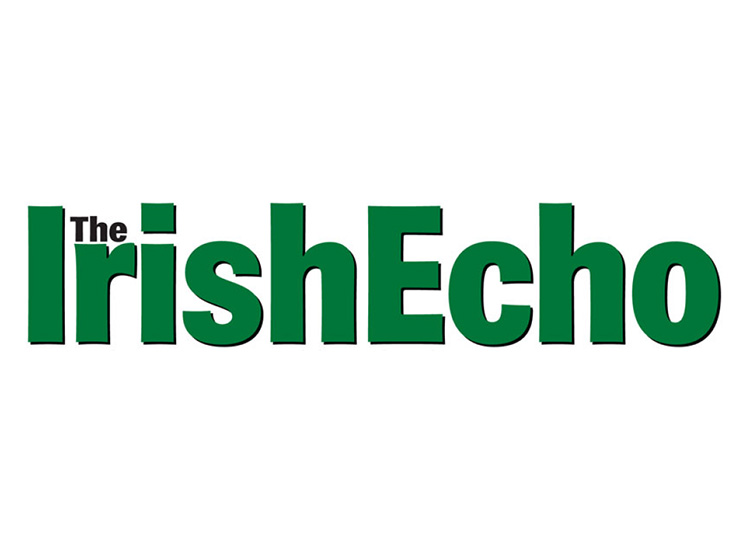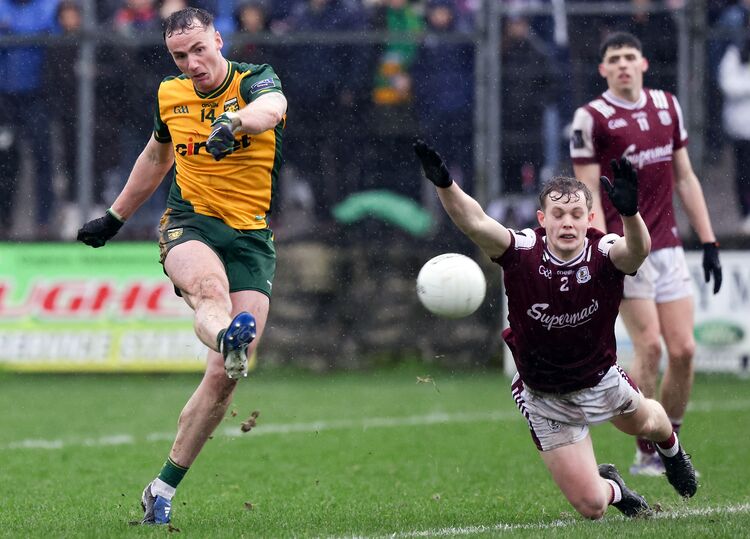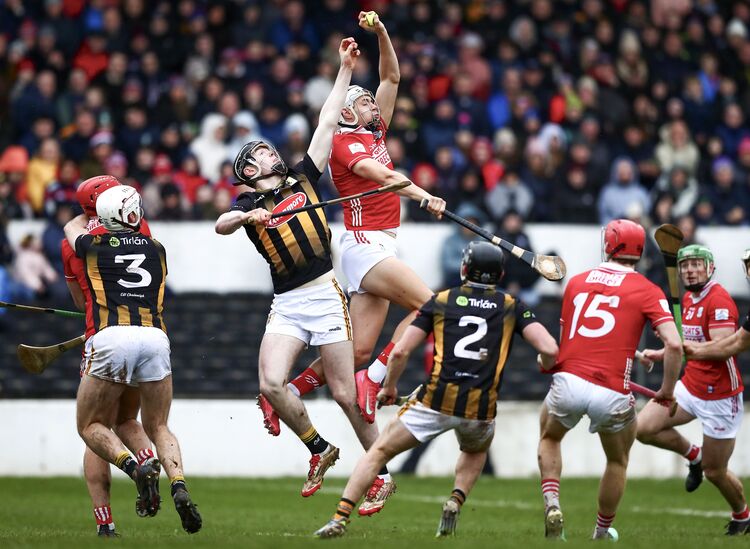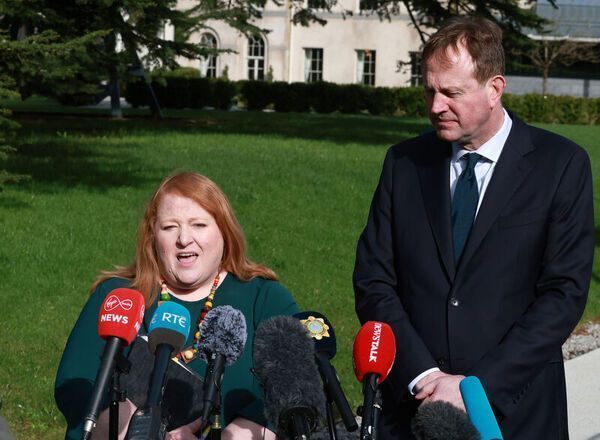Senator Aodhán Ó Ríordáin pictured outside his Seanad office in May. His anti-Trump speech went viral in late 2016 and led to a movement called the Irish Stand, which has an event in Dublin on Wednesday in conjunction with the Irish Refugee Council. PHOTO BY PETER MCDERMOTT
By Peter McDermott
Aodhán Ó Ríordáin has described his Seanad contribution of Nov. 10, 2016, as both an “out of body experience” and a “rant.”
When he sat down, it was with the feeling that he’d made better speeches. “I felt I hadn’t articulated myself very well,” he recalled. “It wasn’t nuanced or honed or well structured.”
Nonetheless, the video of his remarks in Ireland’s senate went viral and ultimately led to a packed Riverside Church in Manhattan on St. Patrick’s Day, inspired by his critique of the anti-immigrant policies and values of Donald Trump.
On next Wednesday, Nov. 8, the Irish Stand will reconvene in Dublin at Liberty Hall, the headquarters of Ireland’s biggest union SIPTU, with cultural figures like Frances Black, Panti Bliss and David O'Doherty among the featured guests.
The movement that began with a speech viewed by more than 50 million worldwide seems to have every intention of continuing into the future.
A junior minister for the last 22 months of the 2011-2016 government, Senator Ó Ríordáin was in November 2016 getting used to the “rhythm,” as he put it, of a new administration. It was, and is, led by Fine Gael, but without the participation of the Labour Party, which was coming to terms with the trauma of the worst electoral reverse in its long history.
The former teacher was one of 31 Labour members who’d lost a Dáil seat in the Feb. 26 poll – in his case only after days of recounts. However, he was elected a few weeks later to the Seanad and thus could continue in full-time politics.
Life was less stressful and seemed a little less hectic out of government. The workload could be just as heavy, though, because all of the policy areas had to be shouldered by a much reduced Parliamentary Labour Party.
When Ó Ríordáin spoke on Nov. 10, he was stepping in for a party colleague. It was the designated hour of the week in the Seanad when a speaker could raise any subject. To his amazement, none of the first six senators had expressed an opinion about or even referred to the earth-shattering news of the previous morning -- Trump would be the new president of the United States from Jan. 20.
“I felt the anger bubbling up under my skin,” he said. “Brexit had happened in June. We hadn’t expected that. And Trump was elected and we hadn’t expected that.”
Against that backdrop, he said, the far-right presidential candidate Marine Le Pen was in the ascent in France and the populist-right seemed poised to take the presidency in Austria.
“The world seemed to be falling apart,” Ó Ríordáin said.
(In the end, the centrist Emmanuel Macron won the French election handily in April on a program and values that were diametrically opposed to Le Pen’s; but in Austria, where a pro-EU Green candidate did edge the presidential election in December, the center-right and far-right parties are now negotiating a governmental pact after the legislative elections there last month.)
Normally, Seanad debate rebroadcasts are seen only by the most dedicated of political junkies or by channel-surfing insomniacs. But Ó Ríordáin is a little more tech and social-media savvy than most senators (likely because his wife Áine Kerr is a professional in the area) and his speeches are put up on Facebook.
By Monday, his Nov. 10 effort had 2 million views, and then some American news sites found out about it. For some reason it was particularly popular in California, where 30 million views were recorded by springtime.
A woman told the Irish senator that she saw a fellow-passenger viewing it on a bus in Germany.
Ó Ríordáin believes that his use of the word “fascist” to describe the U.S. president-elect is what jumped out at people.
“People told me I said what the Democrats weren’t saying,” he said.
But immigration – and Ireland’s historic interest in the issue – was also an important motivating factor for Ó Ríordáin, and also for the Irish and Irish-American people who rallied to the cause in New York.
“We were the Muslims, once,” the senator said, “We were the Mexicans.”
At Christmas, people were asking him: “Now what?

Organizers Caroline Heafey and Ellen O’Brien Kelly
with Cuan Ó Seireadáin following the Irish Stand
event at the Riverside Church on St. Patrick’s Day.
PHOTO BY PETER MCDERMOTT
Dublin-born playwright Lisa Tierney-Keogh, who had successfully organized the New York chapter of Waking the Feminists, became the point person for the Irish Stand in America. The senator added that some Irish-Americans – he cited in particular Ellen O’Brien Kelly and Caroline Heafey – helped make the event a great success.
Saturday opening
It was a rather more local issue that drew Aodhán Ó Ríordáin into politics in the first place.
He worked from 2000 through 2011 as a teacher – for three of those years as principal – at a Catholic primary school for girls from age 4 through 12 or 13 (essentially a state school in the Irish system).
The school is on Sherriff Street in an underprivileged inner-city neighborhood. The term “Sherriff Street” has certain connotations in Dublin giving rise to stereotypes, he said, that are mostly undeserved.
“I enjoyed every second of it and I still miss it an awful lot,” he said about teaching in the neighborhood.
One Friday early on in his career, Ó Ríordáin assigned some students a book he said they could find in the local library. His more middle-class background in Malahide 10 miles north of the city hadn’t prepared him for the report he got back on Monday morning: the library was closed on Saturdays.
It was the spark that led him to join the Labour Party in 2002 with a view to running for Dublin City Council, which he did successfully in 2004; in time, every library in the city was open on Saturdays. He could have gone the independent route as younger politicians increasingly were doing, but his older brother had joined and become involved with the party.
There had been no obvious family tradition in that direction. He said he had a “very Catholic upbringing, a very Catholic, social-justice upbringing,” and it was left-leaning without seeing it as such. His four grandparents were Fianna Fáil voters. The rise of Charles J. Haughey undermined that family loyalty, and his parents preferred to vote for individual over party. There was, though, an “unspoken regard” for Labour as an underdog group.
“My father was always determined to vote against the government,” Ó Ríordáin said with a good-natured laugh.
The son, as it happened, was voted out of parliament last year and as a consequence out of government at age just 39.
It seems an iron law of European politics that the junior partner in government should bear the brunt of the electorate’s wrath. It happened to the French Communists, for instance, when they made common cause with Socialist President Francois Mitterand in the 1980s, and more recently the centrist Liberal Democrats were at the wrong end of a shellacking when the British Conservatives under David Cameron went to the country.
It was long predicted that the junior partner would be punished more than the senior partner for the unpopular austerity policies of Taoiseach Enda Kenny’s government. And so it proved. Whereas Fine Gael dropped from 36.1 to 25.5 percent in its share of the first-preference vote, Labour’s nosedived from 19.5 to 6.6 percent (having previously hovered around the 10-percent mark for more than a decade).
“It’s an emotional old job, politics,” Ó Ríordáin said in reference to losing so many of his colleagues, some of them good friends.
Personally, he felt he achieved quite a lot in government after his 2014 appointment as minister of state (that is, a minister without Cabinet rank) for new communities, culture and equality, particularly by raising issues that hadn’t been discussed before. An additional responsibility for national drugs strategy was added late in the government’s term, and it’s a policy area that he is still closely involved with.
Ó Ríordáin was minister when the 2015 Marriage Equality Referendum was passed, and Travelers’ rights and migrant rights were among the other equality issues on the agenda. Direct Provision (accommodation and welfare, in accordance with international law) for asylum-seekers was another important area, and it’s one that will be a focus of Wednesday’s Irish Stand event.
Ó Ríordáin was lucky, it turned out, that the last government’s reform agenda failed in one area. The proposal to abolish the Seanad (supported by the leaderships of Fine Gael, Labour and Sinn Féin) was defeated in a referendum in 2013.
That body had always helped support unconventional political careers, like for example those of Presidents Mary Robinson and Mary McAleese, both ambitious law professors who’d failed to get elected to the Dáil for Labour and Fianna Fáil respectively. And Labour’s second president, the incumbent Michael D. Higgins, spent a term in the Seanad when he lost his seat after his first stint in the Dáil.
Ó Ríordáin hopes that, just like President Higgins did in 1987, he can make a return to the Dáil at the next general election. For now, the Seanad provides an important forum for his views.
The bottom rung
On the issue that led to his foray into transatlantic politics, he said: “We’re in between Trump and Brexit. We have a responsibility, I think, to speak to these things,”
As for bringing the message to New York, the obvious target date was March 17, 2017.
“St. Patrick’s Day is probably the only time that an Irish politician has a right to say anything about domestic American politics,” Ó Ríordáin said. “The entire political system in Ireland decamps to the States and, it appears to us, that the American system for that one day turns a little bit Irish.
“So we felt we had to provide a platform for Irish and Irish-Americans who are not happy with the regime.”
The Irish Stand fully supported Taoiseach Kenny’s taking part in White House events, although Ó Ríordáin believed that Kenny’s forceful speech at the time on immigration issues was in part due the pushback from the group and others.
Generally, the senator said, the Irish people have largely identified with the U.S. Democratic Party from the era of JFK through to Obama. He detected some admiration for Senator John McCain when he made his presidential bid in 2008, but very little for Donald Trump. And so in 2016 and 2017, there was much media attention given in Ireland to the number of Irish-Americans prominently involved with the Trump administration and in conservative media.
“You begin to think ‘My God, is there anybody with an Irish name that doesn’t support this guy?” Ó Ríordáin said.
“I’m an outsider and there are people in the Irish-American community who might think we are disconnected from the reality, but I do find it galling when I see these guys from the Trump administration with green ties and shamrocks on their lapels trying to justify cutting back on famine relief. That really hurts your sense of Irishness.
“The word ‘famine’ is something that resonates with Irish people. It may have been 150 years ago, but it’s not something that the Irish psyche has forgotten,” the senator added.
Cutting development aid and not taking in people who are fleeing famine, he said, “are completely at odds with our view of Irishness and the Irish story.”
Ó Ríordáin said: “We know what coffin ships are all about. We know what overcoming sectarianism is all about. We know about being at the bottom rung of the ladder of social acceptability is all about.”
When Ó Ríordáin arrived in New York City in mid March, the travel ban was a hot-button issue, one that helped promote the event at the Riverside Church, where Dr. Martin Luther King Jr. had spoken 50 years previously.
Novelist Colum McCann, comedian Maeve Higgins and traditional musician Mick Moloney were among the Irish-born New York City residents in the lineup.
But the Irish Stand had to broaden the mix to present a “positive view of immigration, of multiculturalism, of humanity, of equality, of justice. of all those things as the real experience of the Irish.”
Ó Ríordáin said: “To find common cause with Mexican-Americans, with Jewish-Americans, Muslim-Americans, and undocumented Americans was very important to us. I think we did it successfully.
[caption id="attachment_91104" align="alignnone" width="200"]
PHOTO BY BRYAN MEADE[/caption]
“It went on for half an hour longer than maybe it should have, but we tried to fit in as many voices as we could,” he said.
“There were a few moments of real electricity that night,” he remembered. “The speech by [Ethel and Robert Kennedy’s son] Max Kennedy speech was one of them and there was a musical act that was pretty incredible.”
There was also a practical outcome to the evening in that the 1,500 attendees raised $20,000 for the ACLU. “It might help someone get legal representation,” he said.
In Wednesday’s event at Liberty Hall, the organizers will focus on the plight of undocumented workers in Ireland and the issues around asylum seekers. Generally, though, the indications are that there’ll be a preference for cultural performance over speechifying.
Meantime, the Irish Stand has not forgotten New York. The Riverside Church is booked again for March 17, 2018.
“As long as people support us, we’ll keep coming back,” Ó Ríordáin said.
Tickets for Wednesday's event can be bought here.









